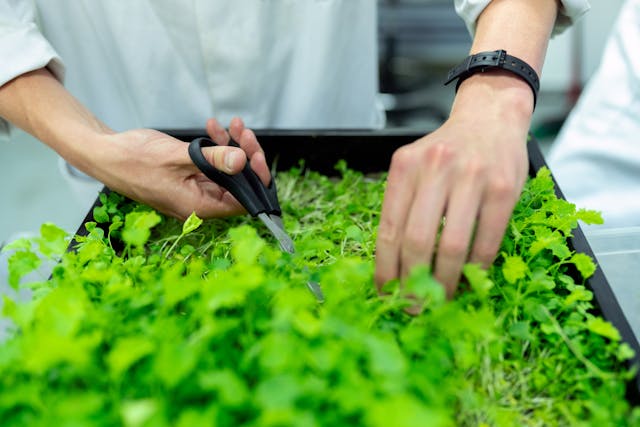Green Dream – Could You Be a Successful Herbpreneur?
Are you an aspiring entrepreneur with a passion for plants? If so, herbs offer a golden opportunity to create a thriving business. These versatile plants not only require minimal space to grow but also boast high value per unit, making them a lucrative choice for business ventures. The market for herbs is also rising as more people embrace healthier lifestyles and natural alternatives, making commercial herb production a compelling and viable business prospect. This industry not only promises financial returns but also contributes to the well-being of communities and the planet, aligning profit with purpose.
So, what does it take to turn your interest in herbs with their myriad of uses—culinary, medicinal, aromatic, and therapeutic—into a niche agricultural success story?
Growing Herbs for Profit
The potential profitability of herb-based businesses is a strong motivator for aspiring entrepreneurs. But you’ll need passion, knowledge, strategic planning, and savvy marketing to become a niche agricultural success story. Here’s how you can turn your passion for growing herbs into a thriving business:
-
Educate Yourself
Comprehensive research can help you dive deep into the fascinating world of herbs. Before you start planning your business, make sure you thoroughly understand the various types of herbs—culinary, medicinal, aromatic, and therapeutic—and their specific growing conditions, harvest methods, and uses. This knowledge will not only make you feel informed and prepared, but it will also give you the confidence to build your herb business successfully.
-
Do Your Research
Understanding the market is a crucial aspect of any business’s success, and herb-based businesses are no exception. You’ll need to identify your target market and their needs. Are local restaurants in need of fresh culinary herbs? Is there a demand for medicinal herbs in your community or online? This knowledge will not only help you choose which herbs to grow but also guide you in positioning your product, making you feel informed and prepared.
-
Create a Business Plan
Develop a detailed business plan that outlines your business model, expected costs, revenue projections, and marketing strategies. This plan will be crucial for securing funding, if necessary, and for guiding your business decisions in future.
-
Embrace Sustainable Farming
As part of your niche market appeal, it’s vital to embrace sustainable and organic farming practices that will attract health and environmentally-conscious customers. Consider techniques like composting, natural pest control, and water conservation to enhance your reputation as a sustainable business.
-
Legalities and Regulations
Familiarise yourself with the legal aspects of running a niche agricultural business, including acquiring any certifications required for selling medicinal herbs, business licenses, and health and safety regulations.
-
Effective Marketing
Develop a strong brand identity and market your herbs using various platforms. Online marketing, farmers’ markets, partnerships with local businesses, and social media can be effective channels to reach your target audience. Business storytelling is also a powerful tool for sharing the uniqueness of your herbs and their uses with your customers.
-
Diversification
Exploring different revenue streams to maximise your profits in the herb business is important. In addition to selling fresh or dried herbs, you could consider producing herb-infused products like teas, oils, cosmetics, or culinary blends. Diversification can help protect your business against market fluctuations and increases your customer base.
-
Networking
Networking is crucial to build relationships that help your business thrive. You should attend events to meet with other farmers, local businesses, and herbalists. It’s also helpful to join agricultural or trade associations that can provide valuable resources, support, and networking opportunities.
-
Quality Control
Quality control is crucial to ongoing success when you’ve established your business. Ensure the herbs you cultivate (and any products made from them) are of the highest quality. Quality products will help you build a loyal customer base and enhance your reputation in the market.
-
Continuous Learning and Adaptation
Continuous learning informs you about emerging trends in the herbal and agricultural industry. Make sure your business can quickly adapt its business practices accordingly. Continuous learning and flexibility can help you navigate challenges and seize new opportunities.
Turning your interest in herbs into a niche agricultural success requires dedication and hard work, but by combining your passion for herbs with strategic business practices, you can grow a successful and fulfilling business.
10 Popular Herbs for Commercial Production
Explore commercial herb farming with these nine popular herbs, which promise versatility and high demand. From the culinary delight of basil to the soothing essence of lavender, these herbs are the staple of a thriving agricultural niche industry.

-
Basil
Basil is a staple in Italian cuisine, famously used in pesto, salads, and as a fresh topping on pizzas and pasta. Its sweet, peppery flavour enhances soups, sauces, and marinades. Rich in antioxidants, vitamins (especially Vitamin K), and anti-inflammatory properties, basil can support heart health and reduce oxidative stress. Basil thrives in warm environments with plenty of sunlight. Ensure it’s planted in well-draining soil and keep the soil moist. Pinch off the flowering tops to encourage bushier growth and a bountiful harvest.
-
Mint
Beyond its use in teas, cocktails, and desserts, mint offers digestive benefits, helping to soothe indigestion and alleviate symptoms of IBS. Mint is invasive, so growing it in containers can help manage its spread. It prefers moist, well-drained soils and partial to full sunlight.
-
Coriander
Utilised in cuisines from Latin American to Asian, cilantro adds a fresh, citrusy flavour to dishes. The seeds (coriander) are used as a spice. Coriander can help lower blood sugar levels, fight infections, and promote heart, brain, and gut health. Coriander prefers cooler temperatures and can bolt in hot weather. Plant in well-drained, moist soil and provide some shade in hotter climates to extend its harvesting period.
-
Parsley
Parsley is rich in vitamins A, C, and K and is used to freshen breath and support bone health. It’s a versatile herb that enhances the flavour of salads, soups, and sauces. Parsley requires rich, moist soil and can grow in full sun to partial shade. Regular harvesting encourages new growth.
-
Chives
Chives add a mild onion flavour to dishes and are rich in vitamins and minerals. They’re beneficial for bone health and may have cancer-fighting properties. Chives thrive in full sun and well-drained soil. They’re hardy and can be easily grown in gardens or containers. Regular cutting helps maintain healthy, productive plants.
-
Thyme
Thyme’s strong aroma complements meats, soups, and stews. Medicinally, it’s known for its antibacterial properties and is used to remedy respiratory issues. Thyme prefers well-drained soil and full sun. It’s drought-tolerant, making it a low-maintenance herb ideal for xeriscaping or rock gardens.
-
Rosemary
Rosemary’s needle-like leaves are used in cooking meat, soups, and bread. Its aroma can enhance concentration and mood. Rosemary supports digestive health and may improve memory. It grows best in well-drained soils, requires little water once established, and prefers full sunlight.
-
Sage
Sage has a savoury, slightly peppery flavour. It’s used in medicinal teas for its antiseptic and anti-inflammatory properties. Sage prefers well-drained, sandy soil and lots of sunlight. It’s drought-tolerant and requires minimal watering once established.
-
Lavender
Lavender is used in essential oils and aromatherapy for relaxation and stress relief. It also has antiseptic and anti-inflammatory properties. Lavender thrives in full sun and well-drained soil and requires little water once established, making it perfect for dry climates.
-
Oregano
A staple in Italian, Mexican, and Greek cuisines, oregano adds depth to sauces, meats, and salads. Oregano is rich in antioxidants and has antimicrobial properties. This herb prefers well-drained soil and full sun. It’s drought-tolerant and can be easily propagated from cuttings.
Incorporating these herbs into a commercial herb production business caters to broad market demand for culinary and medicinal herbs and encourages sustainable and organic farming practices. With proper care, these herbs can provide abundant yields, contributing to the success and profitability of a commercial herb business.
Certificate of Commercial Herb Production
Gain the theoretical knowledge and practical applications crucial to growing herbs for commercial production. This professional development course is ideal for aspiring herb farmers, herbal product entrepreneurs, and anyone eager to tap into the commercial potential of herbs.
What You’ll Learn
- Introduction to herb culture
- Using herbs
- The mints
- The daisies
- The parsley family
- The onion group
- Other herbs
- Pests and diseases
- Landscaping
- Herb farming I – Establishing and operating a herb nursery
- Herb farming II – Establishing and operating a herb farm
- Herb farming III – Preparing the business plan for a nursery/farm
Career paths
- Herb farmer
- Herbal product entrepreneur
- Opportunities in the herb industry
If you’d like to learn more about our Certificate of Commercial Herb Production, contact one of our friendly Course Consultants today via Live Chat (Business Hours) or telephone at 1300 76 2221 (Business Hours).




